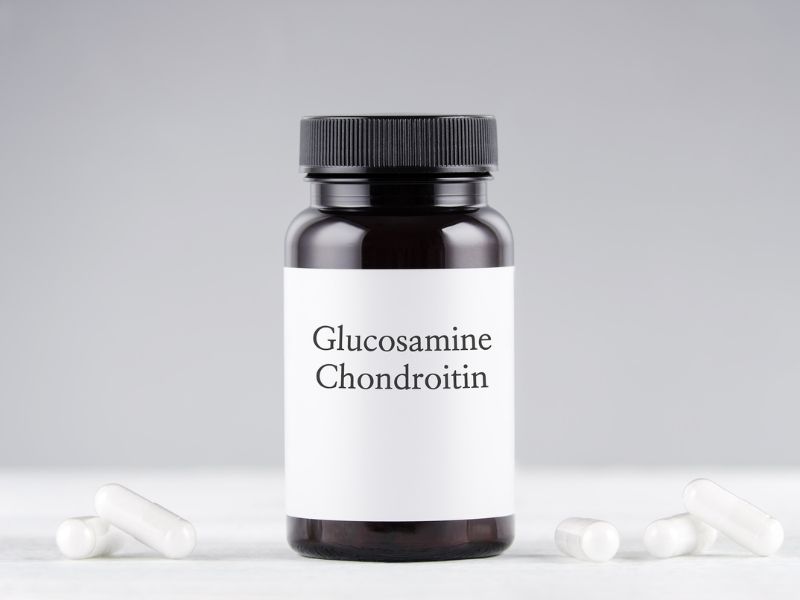The Old Guard: Glucosamine, Chondroitin, and MSM
Once hailed as the holy trinity of joint health, glucosamine, chondroitin, and MSM have been the go-to for years. But why? Are they still the must-haves when it comes to dog joint health ingredients? Part of their staying power comes from early scientific studies that suggested they could help rebuild cartilage and ease joint pain. Over time, these ingredients have become household names, backed by extensive marketing campaigns and consumer testimonials. Do a quick search on the internet for joint supplements for dogs, and you’ll see exactly what we mean. Now, we’re not discounting what’s been researched and shown as effective. More recent research, however, presents a nuanced and updated view. For instance, European studies have shown that the efficacy of glucosamine and chondroitin in treating osteoarthritis is at best inconsistent. We know, we know…it’s always been the dynamic duo of dog joint supplements. That’s why it seems their popularity endures despite this study and others like it. This is partly due to us humans as pet parents and even veterinarians being creatures of habit and the power of marketing. Brands continue to promote these ingredients because they are well-recognized and trusted by the public and pet clinicians and this has created a cycle where popularity breeds more popularity. But not necessarily the best results. Good ingredients aren’t always the best ingredients. And since we’re about the best at Bernie’s Best, that’s what we looked for when it came to creating joint supplements for Bernie and his sister, Lady.
Decoding Other Popular Ingredients

Glucosamine, chondroitin, and MSM are often the top-recommended ingredients in joint supplements for dogs, but several other ingredients frequently appear on the labels of joint supplements. These include:
- Glucosamine Hydrochloride: It’s used to stimulate the growth of cartilage and protect cartilage in the joint. A study involving 35 dogs with osteoarthritis treated with a combination of glucosamine hydrochloride and chondroitin sulfate showed significant improvements in pain, weight-bearing, and severity of the condition by day 70. The response to this treatment was slower than carprofen (like ibuprofen for dogs), but it had a positive clinical effect in dogs with osteoarthritis.
- Omega-3 Fatty Acids: These acids, especially from fish or krill oil, help promote healthy joint lubrication and can reduce inflammation and pain. A trial comparing fish oil supplementation with mineral oil in dogs with osteoarthritis over three months showed significant improvements in objective measures of pain, lameness, and joint disease. The fish oil group experienced significant increases in blood levels of omega-3 fatty acids, which correlated with clinical improvements. The recommended dosage to promote joint health is 100 milligrams of combined EPA and DHA daily for every kilogram of a healthy dog’s body weight.
- Avocado Soybean Unsaponifiables (ASUs): ASUs help protect cartilage by reducing inflammation and stimulating healing after damage. In a study, dogs treated with ASUs showed fewer osteophytes and more robust cartilage than a placebo group. The treatment group also had less metalloproteinase and other microscopic cytokines, indicating that ASUs can be beneficial in decreasing the development of early osteoarthritic cartilage and subchondral bone lesions. However, they are not beneficial for dogs with end-stage arthritis.
- Chondroitin Sulfate: This ingredient protects cartilage by stopping enzymes that destroy it. It works in tandem with glucosamine hydrochloride and ASUs, and these ingredients work better together than separately.
- Cannabidiol (CBD): CBD oil is suggested to work by modulating pain and inflammation through the endocannabinoid system. A study suggested that a twice-daily dosage of 2 mg/kg can reduce pain and increase activity in dogs with arthritis. A systematic review and meta-analysis of studies on CBD in dogs with osteoarthritis found that treatment with oral full-spectrum CBD oil may reduce pain severity and interference scores. Still, the certainty of evidence was very low. While CBD is generally considered safe and well-tolerated, the evidence for its clinical efficacy in treating canine osteoarthritis is uncertain, and high-quality clinical trials are needed for further evaluation. Additionally, some are concerned about the ethics behind CBDs and dogs since efficacy is uncertain.
The New Wave: Science-Backed Natural Alternatives
Bernie’s Best came to be because we started with our own dogs. Like we said, we wanted the best for Bernie and Lady, and we wanted whatever we created to be easy, affordable, and most of all, science-based. We needed to create something for both of their joint health, as they’re bigger breeds, so that set us on a course to find the most effective ingredients out there. While glucosamine, chondroitin, and MSM have long been the go-to ingredients in this realm, we found that current science is shedding light on more natural, efficacious alternatives. That’s what we wanted and these are some of the ingredients we used in both Healthy Hips and Marvelous Mobility. Of course, some of them are found in other joint supplements, but we’re unique in our combination of them all.
- Turmeric & Boswellia: Both these natural ingredients have gained fame for their anti-inflammatory properties. Turmeric contains curcumin, a compound that has been shown in studies to reduce pain and inflammation in arthritis. A study published in the “Journal of Veterinary Pharmacology and Therapeutics” found that curcumin significantly reduced symptoms of joint inflammation in dogs. Boswellia, meanwhile, has boswellic acids, known to inhibit inflammatory processes.
- Blueberry Powder & Decaffeinated Green Tea Extract: Packed with antioxidants, these ingredients protect your dog’s cells from oxidative damage. A recent study highlighted the role of antioxidants in reducing inflammation and supporting joint health. Decaffeinated green tea extract provides these benefits without the risk of caffeine.
- Yucca Schidigera & Black Pepper Extract: Yucca Schidigera is noted for its digestive health benefits, crucial for nutrient absorption for joints. Black pepper extract, containing piperine, enhances the absorption of other nutrients, as shown in the Journal of Ayurveda and Integrative Medicine.
- Astaxanthin: This powerful antioxidant combats oxidative stress, a key factor in inflammation and joint damage.
- Undenatured Type-II Collagen: Critical for maintaining cartilage integrity, this ingredient reduces joint wear and tear. A study in the “Journal of the International Society of Sports Nutrition” showed its potential in preventing joint deterioration.
- Flaxseed Oil & Anchovy Oil: Flaxseed oil comes from flax seeds (linseed), and is rich in omega-3 fatty acids, which are crucial for dogs’ joint health. These fatty acids help reduce joint pain and stiffness, which we often see in canine arthritis. Flaxseed oil’s anti-inflammatory properties improve mobility in dogs with joint issues. It contains alpha-linolenic acid (ALA), which the dog’s body converts into eicosapentaenoic acid (EPA; try saying that three times fast!) and docosahexaenoic acid (DHA), found in fish oils. This conversion is essential for harnessing the oil’s joint health benefits. Anchovies are also rich in omega-3 fatty acids and offer similar benefits for dogs’ joints by reducing inflammation. This makes them beneficial for older dogs or those with joint issues.
- VermarisⓇ EPA + DHA, Algal Oil: These plant-based omega-3 sources further contribute to reducing joint inflammation.
- Green-Lipped Mussel: Its fatty acid and mineral profile is unique; it supports joint components and reduces inflammation. It’s derived from a type of mussel native to New Zealand, and contains more omega-3 fatty acids, great for their anti-inflammatory and joint-protecting properties. While the exact mechanism of its action is not fully understood, evidence suggests it might be beneficial to people with osteoarthritis when taken alongside painkillers like acetaminophen or non-steroidal anti-inflammatory drugs (NSAIDs). It seems to be relatively well-tolerated, with little GI side effect as some other supplement ingredients have. Clinical trials involving green-lipped mussel have shown it to be more effective than a placebo in reducing pain, improving function, and enhancing overall quality of life when used with usual painkillers and NSAIDs.
- Kelp Powder, Vitamin C, Boron, and Vitamin K2: Kelp Powder: Kelp is known to reduce joint inflammation and arthritis pain in dogs. Its rich composition of iodine, amino acids, vitamins, and minerals supports overall health, including joint health. Beyond joints, kelp aids in digestion, boosts metabolism, promotes healthy skin and coat, and even repels fleas. It’s particularly beneficial for senior dogs, where its iodine content supports healthy brain function and energy levels. Vitamin C is crucial for collagen production, and essential for maintaining healthy dog joints. It also helps reduce inflammation and is particularly beneficial for older dogs with arthritis or hip dysplasia. Apart from joint health, vitamin C boosts the immune system and may help in stress reduction. High doses of vitamin C, sometimes as much as 2,000 milligrams, are often recommended for dogs with joint problems, but it’s important to consult with a veterinarian before starting supplementation. Boron plays a significant role in calcium metabolism and integration into the bone matrix, essential for joint health. It can help reduce inflammation and arthritis pain and is associated with fewer cases of osteoarthritis. Besides joint health, boron is important for overall bone health and may slow cognitive decline in aging dogs. A boron deficiency can lead to weakened bones and osteoporosis, which is why its inclusion in a dog’s diet is vital for maintaining strong bones. Vitamin K is important for maintaining a healthy bone structure and preventing joint problems and hip dysplasia. It’s also known to relieve pain associated with arthritis. Vitamin K2 supports bone and heart health and plays a role in calcium metabolism, which is crucial for overall health. Dogs naturally synthesize vitamin K2 in their intestinal tract, and additional supplementation may be beneficial in certain medical conditions.
Marvelous Mobility: A New Era in Canine Joint Health

As pet parents, we’re on a journey toward understanding what’s truly best for our furry friends. The move towards natural, scientifically supported ingredients in joint health supplements reflects our broader shift in pet care. We value long-term health and well-being over quick fixes. We want to know what really works in the long game and are not interested in what’s popular if it’s not what works best. It’s important to look beyond the label so you can find ingredients that not only sound good but are genuinely good for our dogs too–and backed with newer, current science!





